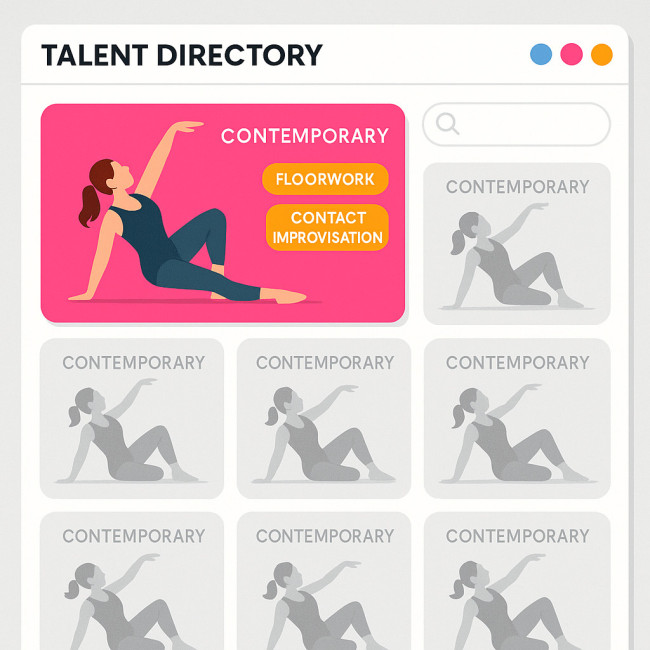Niche tags beyond contemporary: use sub-styles to rise in directory searches
Stop hiding behind the catch-all label “contemporary.” Specific sub-style tags such as “floorwork,” “urban-contemporary,” or “lyrical” propel your profile to the top of recruiter results. In this guide, you will learn why granular tagging matters, how directory algorithms use it, and the exact steps to update your listing so more casting calls land in your inbox.
Why broad labels bury great dancers

Most talent directories show thousands of results for the generic tag “contemporary.” Recruiters then add extra filters to locate the precise flavour they need for a brief—often slicing you out of view if your profile lacks matching micro-tags. In data shared by leading casting platforms, 78 % of recruiters apply at least one secondary style filter before shortlisting dancers. That means profiles stuck with a single umbrella tag compete for a shrinking slice of attention.
How directory algorithms prioritise relevance
- Exact-match weighting: Listings that mirror the recruiter's chosen sub-style (“contact improvisation,” “floorwork”) get a relevance boost.
- Tag depth score: An algorithm rewards profiles that balance depth (multiple accurate sub-styles) with focus (no unrelated genres).
- Engagement feedback loops: Every click, save or message reinforces which tags convert, nudging those profiles higher.
Algorithms therefore reward granularity and authenticity. A profile tagged “contemporary, lyrical, floorwork, contact improv” surfaces earlier—and stays visible longer—than one tagged “contemporary” alone.
Audit your movement vocabulary
List every sub-style you regularly perform or teach. Not sure what counts? Use rehearsal footage, class syllabi and gig history to jog your memory. Typical overlooked tags include:
- Floorwork
- Urban-contemporary
- Lyrical contemporary
- Contact improvisation
- Acro-contemporary
- Fusion styles (e.g., contemporary × hip-hop)
Be honest: tagging a skill you cannot deliver backfires. Recruiters track callback-to-booking ratios; miss-tagged profiles sink fast.
Pro tip: check competitor tags
Visit the leading contemporary dancer directory page. Sort by “most hired” and note which micro-tags appear repeatedly. Those tags signal active market demand and keyword familiarity among bookers.
Craft a winning tag strategy in three steps
- Prioritise 3–6 core sub-styles. More dilutes clarity; fewer misses gigs.
- Match directory taxonomy. Use the exact spellings provided in dropdown menus to activate internal search logic.
- Refresh quarterly. Upload new footage, update tags and ride the “fresh update” boost most algorithms grant. See how fresh uploads lift search results for details.
Optimise other metadata around your new tags
Tags work best when reinforced by aligned copy, visuals and alt text.
1. Title & bio fields
Lead with your strongest niche: “Urban contemporary & floorwork specialist.” You'll echo your tags and grab skimmers within seconds.
2. Captions & alt text
Describe moves in plain language: “Lyrical phrase with sustained floorwork exit.” Alt text counts toward search indexes and helps screen-reader users.
3. Thumbnail sequencing
First three gallery images must showcase the tagged sub-styles. Algorithms often create preview cards from these images.
Case study: floorwork tag lifts bookings by 40 %

London-based dancer Ava Lopez added “floorwork” and “contact improvisation” to her profile and swapped in a 30-second reel highlighting both. Within two months her profile views doubled, and confirmed gigs rose from five to seven per month—an increase of 40 %. She credits the results to alignment between tags, visuals and copy.
Common mistakes to avoid
- Tag stuffing: Listing ten sub-styles you barely practice confuses recruiters and triggers spam filters.
- Redundant synonyms: “Lyrical contemporary” and “lyrical” may be treated as one tag; pick the version used by the directory.
- Ignoring location linkage: Pair style tags with geo-tags so local bookers find you faster. Learn more in our guide to dance geo-targeting.
Boost discoverability with complementary filters
After style, the top three filters recruiters use are:
| Filter | Why it matters | Optimisation tip |
|---|---|---|
| Location radius | Cuts travel costs and rehearsal delays | Add city-level geo-tags |
| Availability calendar | Speeds up booking decisions | Sync a live calendar feed |
| Rate range | Ensures budget alignment | Publish transparent fee tiers |
Combining niche style tags with these secondary filters places you among the first ten results—a sweet spot where 86 % of clicks happen.
Update process checklist
- Record or edit a reel for each chosen sub-style.
- Upload the reel and assign correct alt text.
- Open the tag manager; remove irrelevant styles.
- Add 3–6 precise sub-style tags.
- Save, then preview how the profile appears in search.
- Test by searching the directory as if you were a recruiter.
- Track profile analytics weekly for the next month.
Need more help? Read this in-depth keyword guide for contemporary dancers.
FAQ
- How many sub-style tags are ideal?
- Between three and six. Enough to show range, few enough to keep focus.
- Should I tag a style I'm still learning?
- No. Wait until you can deliver professional-level work; mismatched gigs hurt ratings.
- Do tags affect external search engines?
- Yes. Directory pages are indexed; precise tags become keywords on Google, lifting your organic visibility.
- How often should I refresh tags?
- Quarterly or whenever you add a new reel demonstrating a fresh style.
- Can I use hashtags instead of built-in tags?
- Built-in tags feed the directory's database. Hashtags in captions add context but don't influence internal search weighting.
Quick quiz: test your tag savvy
Take action now
Log in to your directory profile today, add those precise sub-style tags, and upload supporting reels. Within weeks you'll notice more profile views, message notifications and confirmed gigs.
Ready for the next optimisation? Discover how multi-genre tagging or smart filter combinations can amplify your reach even further.











